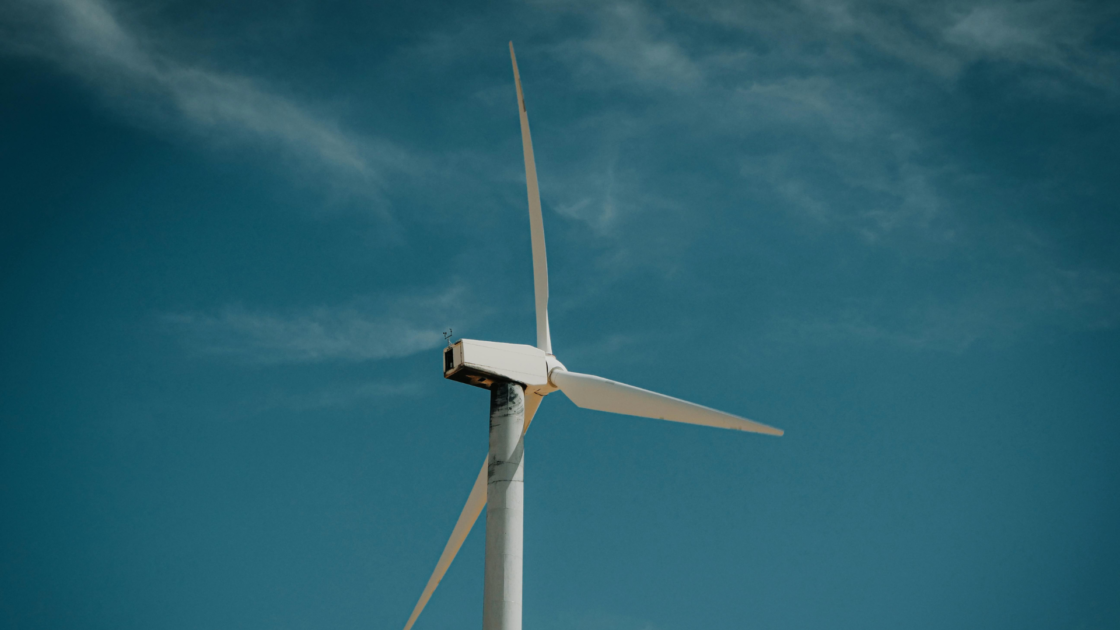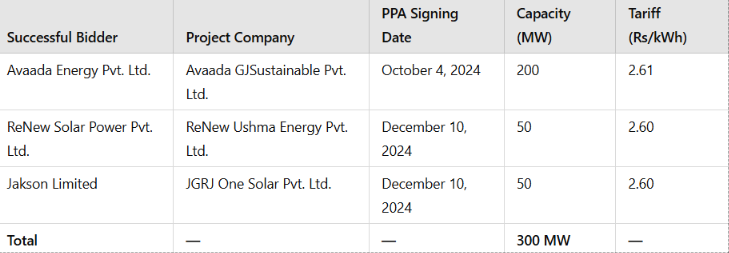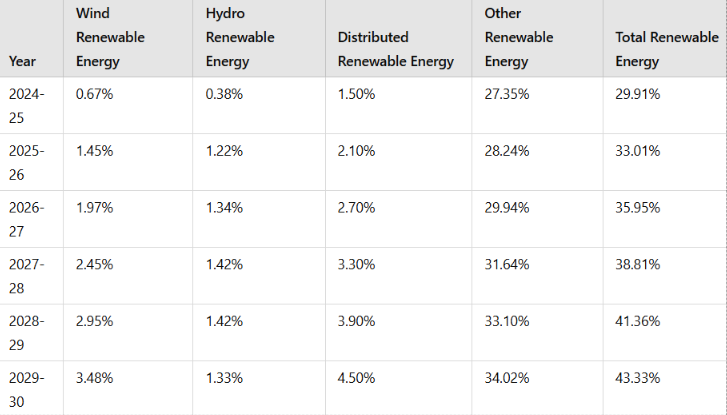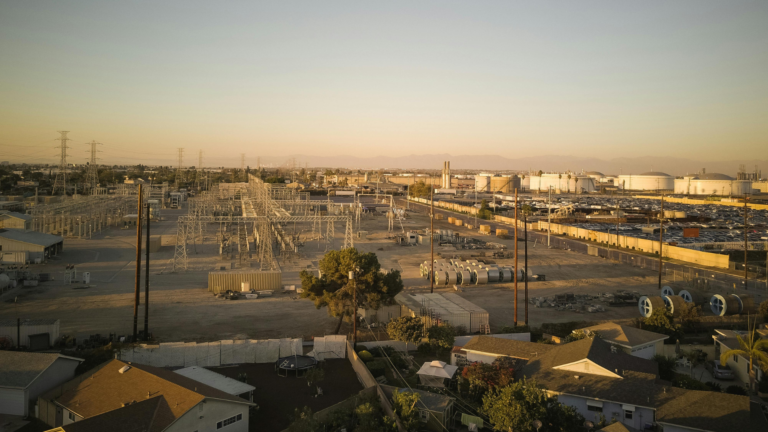Author: PPD Team Date: 12/02/2025

MPERC approves Nahar Spinning Mills’ review petition on RPO compliance
The Madhya Pradesh Electricity Regulatory Commission (MPERC) has approved Nahar Spinning Mills Limited’s petition for a review of the order dated October 4, 2024, in suo motu Petition No. 45 of 2024.
The commission noted that in response to a notice requesting details of open access energy drawn from the energy exchange between FY 2010-11 and FY 2023-24, the petitioner submitted data on renewable energy certificates (RECs) procured for renewable purchase obligation (RPO) compliance. The commission relied on information from the state load despatch centre (SLDC) regarding scheduled open access energy and the petitioner’s affidavit detailing RECs while assessing RPO compliance.
The commission has allowed the review petition for revising the computation of RPO, incorporating consumption from the petitioner’s 2.8 MW and 1.2 MW captive solar plants. The revised RPO compliance computation now reflects the updated information.
The petitioner has been directed to procure the required RECs within 30 days from the date of the order and submit proof of procurement to both the commission and the nodal agency within seven days of purchase.
Petition No: Review Petition No. 74 of 2024
Click here to read the full order.
APTEL approves ACME Heergarh Powertech’s appeal on SCOD extension
The Appellate Tribunal for Electricity (APTEL) has approved ACME Heergarh Powertech Private Limited’s (AHPPL) petition against the impugned order passed by the Maharashtra Electricity Regulatory Commission (MERC) in Case No. 07 of 2022, dated July 7, 2022. The appeal sought an extension of the scheduled commercial operation date (SCOD) for AHPPL’s 300 MW solar power project at Bhadla, Bap, Jodhpur, Rajasthan, from April 20, 2022, to May 23, 2022, citing force majeure (FM) due to global supply chain disruptions caused by the Covid-19 pandemic.
The tribunal noted that the petitioner faced delays in module and equipment supply from China, with an estimated delivery date between February 22, 2022, and March 9, 2022. The force majeure period was considered from November 26, 2021, to March 9, 2022 (104 days), while the project was commissioned with a 70-day delay on May 23, 2022.
APTEL has set aside MERC’s order, allowing the appeal in Appeal No. 330 of 2022 and extending the SCOD up to the actual commissioning date. The appellant is entitled to all consequential benefits accordingly.
Petition No: APPEAL No. 330 OF 2022 & IA NOS.1194 OF 2022 & 213 OF 2023
Click here to read the full order.
CERC approves SECI’s petition for adoption of tariff for 900 MW solar projects
The Central Electricity Regulatory Commission (CERC) has approved Solar Energy Corporation of India Limited’s (SECI) petition for the adoption of tariff for 900 MW Solar PV Power Projects (Tranche XI). These projects are connected to the inter-state transmission system and were selected through a competitive bidding process.
CERC noted that SECI followed a transparent bidding process in accordance with guidelines issued by the Ministry of Power. Under Section 63 of the Electricity Act, the commission has adopted the individual tariffs agreed upon by the successful bidders, with power purchase agreements (PPAs) already executed. The details of 300 MW capacity with finalized PPAs are:

The remaining 600 MW capacity has also been adopted, subject to SECI finalizing PPAs and power supply agreements (PSAs):

CERC also noted that distribution licensees have agreed to a trading margin of Rs 0.07 per kWh in the PSAs, in line with Regulation 8(1)(d) of the Trading Licence Regulations. However, if SECI fails to provide an escrow arrangement or an irrevocable and unconditional letter of credit, the trading margin will be limited to Rs 0.02 per kWh as per the regulations.
Petition No: 387/AT/2024
Click here to read the full order.
CERC approves CESC’s petition for adoption of tariff for 300 MW solar power
The Central Electricity Regulatory Commission (CERC) has approved CESC Limited’s petition for the adoption of tariff for the long-term procurement of 300 MW solar power. This includes 150 MW base capacity and an additional 150 MW under the green shoe option, from a grid-connected project to meet its renewable purchase obligation (RPO).
CERC noted that the tariff was discovered through a competitive bidding process in accordance with the Ministry of Power Guidelines. Under Section 63 of the Electricity Act, the commission has adopted the following individual tariff for the project, which will remain valid for the duration of the power purchase agreement (PPA):

Petition No: 365/AT/2024
Click here to read the full order.
CERC approves SECI’s petition for adoption of tariff for 450 MW solar power projects
The Central Electricity Regulatory Commission (CERC) has approved Solar Energy Corporation of India Limited (SECI)’s petition for the adoption of the tariff for 450 MW solar power projects (Tranche XVI) connected to the inter-state transmission system. These projects were selected through a competitive bidding process.
The commission noted that the tariffs for the solar power projects were discovered by SECI through a transparent process, in accordance with Ministry of Power guidelines. As per Section 63 of the Electricity Act, the commission has adopted the tariffs for the following successful bidders, subject to SECI tying up the awarded capacity through Power Purchase Agreements (PPA) and Power Sale Agreements (PSA):

The commission also noted that SECI has requested approval for a trading margin of Rs 0.07 per kWh to be charged to the end procurer or any other entity over and above the PPA tariff, as per the request for selection document and Solar Guidelines.
Further, the awarded capacity is yet to be tied up with the distribution licensees, and therefore, the trading margin will be as per the provisions in the PSAs. However, if SECI fails to provide an escrow arrangement or an irrevocable, unconditional, and revolving letter of credit to the solar generators, the trading margin will be limited to Rs 0.02 per kWh as per Regulation 8(1)(d) and Regulation 8(1)(f) of the Trading Licence Regulations.
Petition No: 346/AT/2024
Click here to read the full order.
HERC issues draft HERC (Green Energy Open Access) 1st Amendment Regulations, 2025
The Haryana Electricity Regulatory Commission (HERC) has issued the draft HERC (Green Energy Open Access) Regulations, 2023, 1st Amendment Regulations 2025. These amendments follow updates to the Ministry of Power’s Electricity (Promoting Renewable Energy through Green Energy Open Access) Rules, 2022.
Key amendments include:
- Amendment of Regulation 4 (Eligibility Criteria for Green Energy Open Access)
- Consumers with a contracted demand or sanctioned load of 100 kW and above, either through a single or multiple connections aggregating 100 kW or more, located within the same electricity division of a distribution licensee, shall be eligible for green energy open access.
- There is no limit on the supply of power for captive consumers under green energy open access.
- Consumers not on independent feeders may take power under open access if they agree to the system constraints and power cut restrictions imposed by their distribution licensee. In these cases, under-drawl due to power cut restrictions will not be compensated.
- Amendment of Regulation 8(2) (Exemption from Additional Surcharge)
- Additional surcharge will not apply if electricity is produced from offshore wind projects commissioned by December 2032 and supplied to open access consumers.
Regulation No: HERC/59/2023/1st Amendment/2025
KERC notifies KERC (Procurement of Energy from Renewable Sources) (Eleventh Amendment) Regulations, 2025
The Karnataka Electricity Regulatory Commission (KERC) has notified the KERC (Procurement of Energy from Renewable Sources) (Eleventh Amendment) Regulations, 2025.
Amendment to Regulation 4 of the Principal Regulation:
Sub-Clause 4(i), (ii), and (iii) of Regulation 4 have been modified as follows:
- Minimum Purchase Requirement from Non-Fossil Sources (Renewable Energy):
Every distribution licensee shall purchase a minimum percentage of electricity from non-fossil sources (renewable energy) as a percentage of their total energy consumption. The renewable energy components include:

- The wind renewable energy component will be met by energy produced from wind power projects (WPP) commissioned after March 31, 2024.
- The hydro renewable energy component will be met only by energy produced from hydro power projects (including pump storage projects and small hydro projects) commissioned after March 31, 2024.
Regulation No: KERC/SC(F)/RPO/2024/1358
Click here to read the full order.
MERC rejects petition filed by CPPA seeking amendments in existing regulations
The Maharashtra Electricity Regulatory Commission (MERC) has rejected the petition filed by the Captive Power Producers Association (CPPA) seeking amendments to the existing regulations for establishing, operating, scheduling, and commercially settling wind-solar-thermal hybrid power plants intended for use under open access in Maharashtra.
The hybrid power plants were proposed to be set up in accordance with the Ministry of Power’s Bundling Scheme 2022, which aims to bring flexibility in the generation and scheduling of thermal/hydro power stations by bundling them with renewable energy (RE) and storage power. However, the commission noted that the current regulations do not accommodate the integrated operation of RE and non-RE generators.
The commission highlighted significant differences in the treatment of RE power and thermal power, particularly in areas such as scheduling, open access permissions, energy billing, deviation settlement mechanism (DSM) accounting, merit order dispatch, and more. The existing framework does not account for bundled thermal/hydro power combined with RE, and major regulatory changes would be necessary to incorporate such operations across multiple regulations including Open Access, DSM, Grid Code, and RE Tariff Regulations.
As a result, the commission has directed the Grid Coordination Committee to conduct a detailed study on the implementation of the Bundling Scheme in the state. The committee is advised to gather inputs from national bodies like the Grid Controller of India and Central Electricity Authority, as well as from local stakeholders such as generating companies, distribution licensees, RE generators, and state transmission utilities.
The committee is tasked with addressing key operational aspects such as metering, connectivity, scheduling, energy accounting, DSM accounting, transmission and wheeling charges, and preparing a draft framework within six months. This draft will be reviewed by the commission for potential amendments or the creation of new regulations.
Petition No: Case No. 246 of 2023
Click here to read the full order.
Featured photograph is for representation only.



